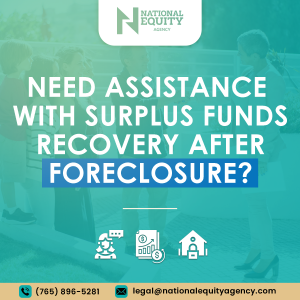
NEA's Guide to Surplus Funds Following Foreclosure

We firmly believe that you deserve a fresh start, and we are unwavering in our commitment to making it happen.
In most cases, surplus funds from a foreclosure sale belong to the homeowner whose property was foreclosed upon, after all debts and costs have been settled.
Becoming a homeowner is a significant milestone for many individuals, symbolizing stability, security, and a place to call one's own. However, unforeseen circumstances such as job loss, medical emergencies, or economic downturns can lead to financial hardships, including the possibility of foreclosure. While navigating the complexities of foreclosure is daunting, there exists a lesser-known opportunity that could potentially alleviate some financial strain: surplus funds.
Understanding Foreclosure and Surplus Funds
Foreclosure, albeit distressing, can sometimes result in surplus funds—a concept not widely understood by homeowners facing such circumstances. Surplus funds refer to the residual money left over after a property has been sold through foreclosure auction, where the sale price exceeds the outstanding mortgage debt and other associated costs. This surplus is legally entitled to the former homeowner once all creditors and lienholders have been satisfied.
For instance, if your property is auctioned for $200,000, yet you owed only $150,000 on the mortgage, you could be entitled to the remaining $50,000 as surplus funds. This unexpected windfall can potentially provide much-needed financial relief, serving as a silver lining amidst the challenges of foreclosure.
Legal Framework and Jurisdictional Variations
The regulations governing surplus funds vary widely across jurisdictions within the United States, each governed by state-specific statutes and case law. In Florida, surplus funds are managed under Section 45.032 of the Florida Statutes, delineating the entitlements and procedures for claiming these funds. It is crucial for homeowners to acquaint themselves with these legal frameworks or seek professional advice to navigate the complexities effectively.
Identifying and Claiming Surplus Funds
Determining whether surplus funds exist and asserting one's entitlement to them can be intricate processes. Homeowners must proactively investigate and understand the specifics of their foreclosure sale, including the sale price, outstanding debts, and any subsequent surplus. This necessitates meticulous attention to detail and, often, the assistance of legal professionals experienced in real estate and foreclosure law.
The claiming process typically involves timely submission of a claim with the appropriate authorities, such as the clerk of courts or tax deed clerk, depending on the nature of the foreclosure sale. Compliance with statutory timelines and procedural requirements is critical, as failure to adhere to these guidelines can jeopardize one's ability to claim the surplus funds.
Economic Implications and Market Dynamics
In dynamic real estate markets, particularly in states like Florida where property values can fluctuate significantly, the potential for surplus funds increases. Investors and developers may bid aggressively on foreclosed properties, driving sale prices above outstanding debt amounts and creating surplus funds. This economic aspect underscores the importance of staying informed and proactive in assessing one's eligibility for surplus funds post-foreclosure.
Practical Considerations and Challenges
Navigating the terrain of surplus funds involves overcoming several practical challenges. From identifying all relevant creditors and lienholders to complying with procedural requirements and deadlines, the process demands thoroughness and accuracy. Mistakes in documentation or missed deadlines can lead to forfeiture of entitlement, highlighting the necessity of professional guidance from attorneys specializing in real estate and foreclosure law.
Case Studies and Examples
Examining real-world scenarios and case studies provides valuable insights into the complexities and outcomes associated with surplus funds claims. Instances where homeowners successfully navigated the process or encountered challenges underscore the importance of preparation and legal counsel in safeguarding one's financial interests during foreclosure proceedings.
Social and Legal Implications
Beyond financial implications, surplus funds can have social and legal ramifications within communities and among stakeholders. They offer a means for homeowners to recoup some of their investment in distressed properties, potentially mitigating displacement and fostering economic stability. Moreover, adherence to legal procedures ensures equitable distribution of surplus funds among rightful claimants, reinforcing confidence in property transactions and judicial processes.
Comparative Analysis and International Perspectives
While this essay primarily focuses on surplus funds in the United States, a comparative analysis with international perspectives enriches our understanding of global practices and regulatory frameworks. Countries such as Canada, Australia, and the United Kingdom also have distinct provisions governing surplus funds from foreclosure sales, offering insights into commonalities and disparities in legal treatment across jurisdictions.
What is meant by surplus funds?
Surplus funds, also known as excess funds or overage, refer to the remaining money after all debts and costs related to a foreclosure or tax sale have been paid off. These funds typically belong to the former homeowner.
What does "excess funds" mean?
"Excess funds" or "surplus funds" are the extra money left over after a foreclosure sale when the sale price exceeds the amount owed to creditors (such as mortgage lenders and lienholders).
Who are the surplus funds from a foreclosure sale generally belong to?
In most cases, surplus funds from a foreclosure sale belong to the homeowner whose property was foreclosed upon, after all debts and costs have been settled.
Who is entitled to surplus funds in Florida foreclosure?
In Florida, surplus funds generally belong to the homeowner whose property was foreclosed upon. However, other creditors may make claims to these funds, which can affect how and when they are distributed.
What does extra proceeds mean?
"Extra proceeds" typically refer to the additional money received from a transaction or sale after all debts, expenses, and obligations have been paid off. In the context of foreclosure, it refers to surplus funds available after paying off the foreclosure-related debts.
What happens to excess proceeds from foreclosure sales in California?
In California, excess proceeds from foreclosure sales are typically forwarded to the state's unclaimed property division if the prior homeowner(s) cannot be contacted. Homeowners are notified of potential surplus funds via mail.
What is the excess of sale proceeds?
The "excess of sale proceeds" refers to the surplus amount left after selling an asset or property, which exceeds the amount needed to satisfy all debts and obligations related to the sale.
What is the meaning of excess funds?
"Excess funds" refer to the leftover money after all financial obligations and debts related to a sale or transaction have been settled. This term is often used in the context of foreclosure and tax sales.
Does proceeds mean money?
Yes, "proceeds" generally refer to the money received from a sale, transaction, or event. It encompasses the total amount generated from selling goods or assets.
What does your proceeds mean?
"Your proceeds" typically refer to the specific amount of money received by an individual or entity from a sale or transaction, after deducting any expenses or costs associated with it.
What is a proceeds payment?
A "proceeds payment" refers to any cash received as a result of selling goods, assets, or securities. It can include dividends, distributions, or payments related to the sale or repurchase of shares.
Are proceeds considered cash?
Yes, "proceeds" are considered cash in the context of financial transactions. They represent the actual money received from selling assets or goods.
What is the legal definition of proceeds?
The legal definition of "proceeds" refers to the money or value obtained from a sale or transaction, after deducting any applicable costs, fees, or expenses.
Who does any excess funds realized at a foreclosure sale belong to?
Any excess funds realized at a foreclosure sale belong to the homeowner whose property was foreclosed upon, after all debts, fees, and costs have been satisfied.
National Equity Agency (NEA) is at the forefront of assisting homeowners in reclaiming surplus funds resulting from foreclosure and tax sales. With a dedicated team of professionals, NEA navigates the complexities of post-foreclosure scenarios, ensuring homeowners receive their entitled funds promptly and efficiently.
Understanding Surplus Funds: A Q&A with NEA
What is meant by surplus funds?
Surplus funds, also known as excess funds or overage, refer to the remaining money after all debts and costs related to a foreclosure or tax sale have been paid off. These funds typically belong to the former homeowner.
What does "excess funds" mean?
"Excess funds" or "surplus funds" are the extra money left over after a foreclosure sale when the sale price exceeds the amount owed to creditors (such as mortgage lenders and lienholders).
Who are the surplus funds from a foreclosure sale generally belong to?
In most cases, surplus funds from a foreclosure sale belong to the homeowner whose property was foreclosed upon, after all debts and costs have been settled.
Who is entitled to surplus funds in Florida foreclosure?
In Florida, surplus funds generally belong to the homeowner whose property was foreclosed upon. However, other creditors may make claims to these funds, which can affect how and when they are distributed.
NEA's Expertise in Surplus Funds Recovery
NEA provides comprehensive assistance throughout the surplus funds recovery process:
Initial Consultation: Educating homeowners about their rights and potential surplus funds available.
Research and Documentation: Conducting thorough research and preparing accurate legal documentation.
Legal Expertise: Navigating intricate legal procedures involved in surplus funds recovery.
Claim Filing: Filing claims on behalf of homeowners with precision and compliance.
Follow-Up: Ensuring prompt follow-up with courts and relevant parties for timely fund disbursement.
Additional Questions Addressed by NEA
What is a surplus fund on a mortgage?
A surplus fund on a mortgage occurs when the amount borrowed from a new lender exceeds the payoff amount owed to the existing lender during a remortgage. These funds are typically sent directly to the homeowner by their law firm upon completion of the transaction.
How to claim surplus funds from foreclosure in NC?
To claim surplus funds from a foreclosure in North Carolina, individuals must file a Petition for Surplus Funds with the court, demonstrating their entitlement to the funds. This process requires presenting evidence supporting the claim for surplus funds.
How long can you not pay your mortgage before foreclosure in Florida?
In Florida, foreclosure proceedings can typically begin after a homeowner is 120 days past due on mortgage payments. Once a foreclosure lawsuit is initiated, homeowners have 20 days to respond to the court to avoid default judgment.
Surplus funds from foreclosure sales represent a critical opportunity for homeowners to reclaim some equity after their property is sold. These funds arise when the proceeds from the sale exceed all the debts and expenses required to be paid according to the final foreclosure judgment. National Equity Agency (NEA), a professional surplus recovery company, specializes in guiding individuals and organizations through the complex process of recovering surplus funds from property sales, particularly after foreclosures or tax sales.
What Are Surplus Funds?
Surplus funds, often referred to simply as "surplus," are the remaining funds generated from the sale of a foreclosed property when the auction price is higher than the total amount owed on the property. This surplus arises after satisfying all outstanding obligations, including the mortgage balance, taxes, liens, and any foreclosure-related expenses mandated by the court's final judgment. For example, if a property with a foreclosure judgment of $200,000 sells at auction for $225,000, the surplus funds would be $25,000.
The Role of Surplus Funds in Foreclosure Sales
Surplus funds play a pivotal role in the foreclosure process by potentially providing financial relief to former homeowners. These funds are not automatically dispersed; homeowners must proactively claim them through specific legal procedures. NEA specializes in guiding homeowners through this process, ensuring they understand their entitlement and maximizing their recovery.
Who is eligible to claim surplus funds?
Typically, the former homeowner of record at the time of foreclosure and any subordinate lienholders, such as second mortgage holders or judgment creditors, are eligible to claim surplus funds.
How does NEA assist homeowners in recovering surplus funds?
NEA specializes in surplus fund recovery by guiding homeowners through the legal process, from initial assessment to filing claims and ensuring timely disbursement, all without upfront costs to the homeowner.
What steps are involved in claiming surplus funds?
Claiming surplus funds involves identifying eligibility, gathering necessary documentation, filing a claim within specified timelines, and awaiting court approval for disbursement.
Why should homeowners choose NEA for surplus fund recovery?
NEA offers a proven track record of successfully recovering surplus funds nationwide, personalized service tailored to each client's needs, and transparent communication throughout the recovery process.
How Surplus Funds Can Impact Homeowners
For homeowners facing the aftermath of foreclosure, surplus funds offer a chance to recover some of their investment in the property. This additional financial resource can help alleviate post-foreclosure challenges and pave the way for a more stable financial future. NEA's dedicated team provides comprehensive support to homeowners, from initial consultation to claim filing and disbursement, ensuring a streamlined and effective recovery process.
NEA's Expertise in Surplus Fund Recovery
NEA stands out for its commitment to integrity and client advocacy in surplus fund recovery. Represented by Better Business Bureau (BBB), NEA leverages its extensive experience and knowledge of foreclosure laws across various states to secure the maximum funds available to homeowners without upfront costs.
Steps to Claim Surplus Funds
Claiming surplus funds involves several critical steps:
Identification: Determine if surplus funds exist from the foreclosure sale.
Legal Assessment: Understand eligibility criteria and procedural requirements for filing a claim.
Documentation: Gather necessary documents and evidence to support the claim.
Filing: Submit the claim within specified timelines and adhere to procedural guidelines.
Disbursement: Await court approval and the disbursement of surplus funds once all legal obligations are met.
Alexander Muniz
National Equity Agency
+1 765-896-5281
email us here
Visit us on social media:
Facebook
LinkedIn
Instagram
Other
EIN Presswire does not exercise editorial control over third-party content provided, uploaded, published, or distributed by users of EIN Presswire. We are a distributor, not a publisher, of 3rd party content. Such content may contain the views, opinions, statements, offers, and other material of the respective users, suppliers, participants, or authors.





